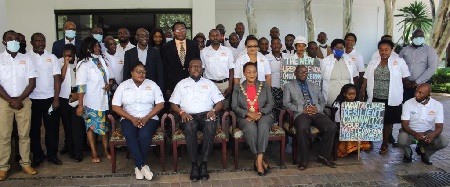Government to promote climate-resilient cities
LUSAKA—Government will not tolerate lawlessness in land allocation, but will promote smart and resilient cities to withstand shocks of changing climatic conditions.
Minister of Local Government and Rural Government Gary Nkombo says that disregard for the law with impunity as witnessed in recent years resulted in people building in undesignated places like the controversial Forest 27, which is a water recharge zone.
Government recognizes that attainment of climate adaptation requires effective planning and monitoring framework that involves all stakeholders.
Mr. Nombo was speaking when he officiated at the commemoration of World Cities Day.
The event, organized by Civi Forum on Housing and Habitat, was under the theme “2021 Urban Planning and Housing Symposium.”
The minister said that the struggle by local authorities to give needed guidance to citizens and private developers is due to factors like limited financial and human resources.
“This has resulted in people building in undesignated zone such as water recharge and water pathways, under Zesco pylons and on top of sewerage pipes.”
“This condition cannot remain unchecked, it requires everyone’s full and urgent attention,” the minister said.
Mr. Nkombo reconfirmed government’s commitment to work with everyone to see the country on the right trajectory in responding to effects of climate change.
He said creation of the Ministry of Environment and Green Economy is testimony of government’s commitment to minimizing climate change negatives.
Civic Forum on Housing and Habitat executive director Grace Mtonga said the commemoration is aimed at facilitating dialogue on climate change effects and creation of resilient cities.
Ms. Mtonga outlined water, sanitation and solid waste challenges, especially in informal settlements like Kanyama and Chibolya.
And WE Effect country representative Faide Nsofu said the organization, being sponsors of World Cities Day through CFHH, is committed to supporting efforts to attain cleaner cities using a human rights-based framework.
Ms. Nsofu said cleaner cities can be achieved through provision of adeq1uate housing, sanitation and solid [waste] management systems.
Lusaka Mayor Chilando Chitangala said a join integrated development plan is being formulated cognisant that 70 percent of the capital city consists [of] unplanned settlement.
[addendum]
Habitat International Coalition’s Housing and Land Rights Network coordinator Joseph Schechla also addressed the symposium, speaking from Tunis. He emphasized how his organization, also sponsoring the event, works with Members such as CFHH to develop the normative dimension of their operations to complement policy and technical efforts to remedy problems by uphold the human right to adequate housing and land, especially through a gender lens.
Photo: Participants in the Uban Planning and Housing Symposium with Lusaka Mayor Chilando Chitangalal seated in center. Source: CFHH.














